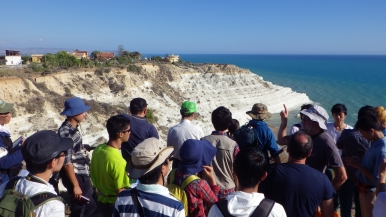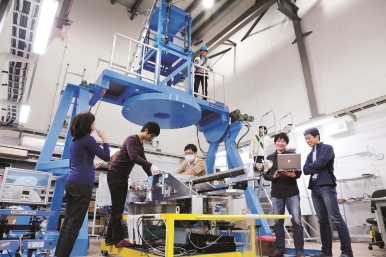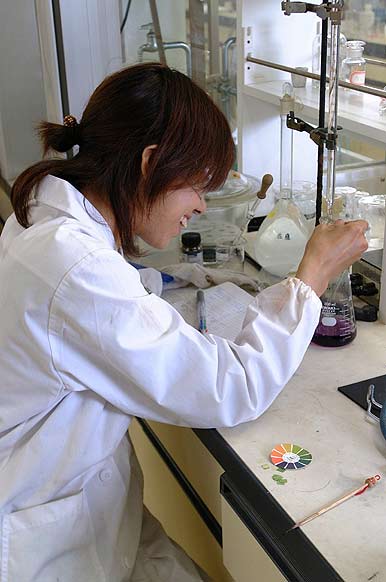The Ten Departments of the Faculty of Science Offer Unique Educational Experiences
Make Learning Hands-on with Fieldwork

The Department of Earth and Planetary Environmental Science and the Department of Biological Sciences place a strong emphasis on fieldwork, which enables students to actively learn in actual natural environments.
In the Department of Earth and Planetary Environmental Science, phenomena taking place on the surface of the Earth and other planets are studied from an environmental perspective. The Department’s goal is to understand the intricately interacting systems at work in the atmosphere, oceans, life cycles and the Earth itself. Students studying rocks, minerals, geological formations and fossils can choose to conduct approximately one week of fieldwork in places including not only Japan but also other countries, such as Australia.
The objective of the Department of Biological Sciences, meanwhile, is to understand the biological mechanisms and phenomena of the myriad of organisms which have appeared and evolved on Earth during the past four billion years. Each of the three areas of flora, fauna and anthropology feature special lectures, such as taxonomy workshops at the University’s affiliated botanical gardens and Yakushima Island (flora), experiments and workshops related to marine organisms at the University’s Misaki Marine Biological Station (fauna), archaeological excavations in Hokkaido (anthropology), and the observation of primate behavior in Nagano’s Jigokudani Monkey Park (anthropology).
In the Department of Earth and Planetary Environmental Science, phenomena taking place on the surface of the Earth and other planets are studied from an environmental perspective. The Department’s goal is to understand the intricately interacting systems at work in the atmosphere, oceans, life cycles and the Earth itself. Students studying rocks, minerals, geological formations and fossils can choose to conduct approximately one week of fieldwork in places including not only Japan but also other countries, such as Australia.
The objective of the Department of Biological Sciences, meanwhile, is to understand the biological mechanisms and phenomena of the myriad of organisms which have appeared and evolved on Earth during the past four billion years. Each of the three areas of flora, fauna and anthropology feature special lectures, such as taxonomy workshops at the University’s affiliated botanical gardens and Yakushima Island (flora), experiments and workshops related to marine organisms at the University’s Misaki Marine Biological Station (fauna), archaeological excavations in Hokkaido (anthropology), and the observation of primate behavior in Nagano’s Jigokudani Monkey Park (anthropology).
Solve Problems on Your Own through Seminars and Observations

Seminars and observations, where students are encouraged to solve problems or obtain data by themselves, are important learning methods that help students develop the fundamental skills necessary for studying science. Particularly with regards to the Department of Mathematics, seminars are considered to be the foundation of the curriculum. Mathematics, a discipline dating back to early history, continues to evolve while at the same time having a wide range of applications by clearly explaining a variety of phenomena through formulas. During seminar classes, students solve problems, make presentations and have discussions with fellow students, thereby honing their academic skills.
In the Department of Astronomy, students deepen their understanding of the mechanisms of various celestial bodies and the universe as a whole. In seminar classes, students obtain observation data with telescopes and use computers to analyze the data. The small number of students (about ten per class year) allows those studying in this Department to receive detailed and thorough instruction.
In the Department of Bioinformatics and Systems Biology, students are required to master both biology and informatics because they conduct experiments and handle enormous quantities of data. Bioinformatics is a discipline that is progressing at a rapid pace, as well as an energetic field that future students can help to both define and refine.
In the Department of Astronomy, students deepen their understanding of the mechanisms of various celestial bodies and the universe as a whole. In seminar classes, students obtain observation data with telescopes and use computers to analyze the data. The small number of students (about ten per class year) allows those studying in this Department to receive detailed and thorough instruction.
In the Department of Bioinformatics and Systems Biology, students are required to master both biology and informatics because they conduct experiments and handle enormous quantities of data. Bioinformatics is a discipline that is progressing at a rapid pace, as well as an energetic field that future students can help to both define and refine.
Conduct Experiments to See and Experience Science Firsthand

Many of the departments at the Faculty of Science place a high priority on conducting experiments. For instance, the Department of Information Science’s curriculum covers programming languages and algorithms and distributed computing. To help students understand the operating principles of computers, the Department offers not only seminars but also opportunities to conduct experiments.
The Department of Physics encompasses a wide range of areas, including particle experiments and condensed matter physics, and consists of both theory-oriented and experiment-oriented laboratories. Basic experiments are important in all areas of physics, including those that focus on theory.
In the Department of Earth and Planetary Physics, students research the Earth, other planets, the Earth’s atmosphere and oceans, and solid earth (earthquakes, etc.) from a physics standpoint. The curriculum closely relates theories to experiments and practical study.
One of the departments that places the highest emphasis on experiments is the Department of Chemistry, where all substances are analyzed at a molecular level. The Department’s third-year undergraduate students spend a large part of their afternoons carrying out experiments.
The goal of the Department of Biophysics and Biochemistry is to enable students to understand biological phenomena at a molecular level. Third-year undergraduate students in this Department also conduct many experiments in the afternoon.
The Department of Physics encompasses a wide range of areas, including particle experiments and condensed matter physics, and consists of both theory-oriented and experiment-oriented laboratories. Basic experiments are important in all areas of physics, including those that focus on theory.
In the Department of Earth and Planetary Physics, students research the Earth, other planets, the Earth’s atmosphere and oceans, and solid earth (earthquakes, etc.) from a physics standpoint. The curriculum closely relates theories to experiments and practical study.
One of the departments that places the highest emphasis on experiments is the Department of Chemistry, where all substances are analyzed at a molecular level. The Department’s third-year undergraduate students spend a large part of their afternoons carrying out experiments.
The goal of the Department of Biophysics and Biochemistry is to enable students to understand biological phenomena at a molecular level. Third-year undergraduate students in this Department also conduct many experiments in the afternoon.





